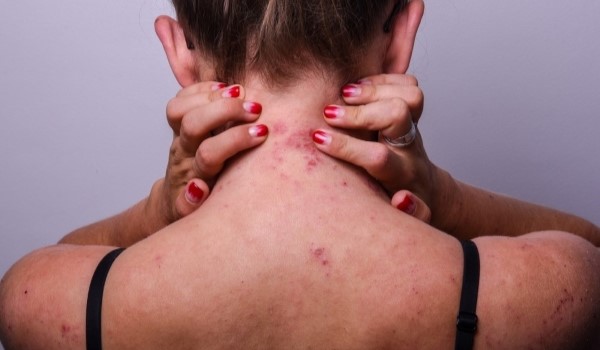What is a
Eczema (skin eczema)?
Eczema is an inflammatory skin condition characterized by redness, itching and rashes. It can have various causes, such as allergic reactions, contact with irritating substances or genetic predisposition. Eczema can be acute or chronic and often affects different areas of the body, including the face, hands and elbows. Appropriate treatment alleviates the symptoms and improves skin health.
About the symptoms
More information
Important facts about skin eczema
Symptoms and consequences of skin eczema
- Reddening of the skin
- Itching and burning
- Skin rashes and blistering
- Dry, flaky skin
- Swelling and pain
- Weeping or crust formation
- Thickened, rough areas of skin
- Sleep disorders due to itching
- Reaction to certain triggers such as allergens or irritating substances
On which parts of the body does eczema occur?
The most common areas where eczema occurs are:
- Face: Especially around the mouth, nose and eyes.
- Hands: On the back of the hands, fingers and wrists.
- Elbows: The skin on the elbows can be affected.
- Knees: Similar to the elbows, the knees can also be affected.
- Neck: Especially in the neck area, where the skin is often sensitive.
What are the causes and forms of eczema?
There are different types of eczema, depending on the cause and symptoms. Some of the most common types are.
Toxic contact dermatitis
Toxic contact dermatitis
Caused by direct contact with irritating substances such as chemicals, metals or certain plants.
Atopic eczema (also known as atopic dermatitis)
Atopic eczema (also known as atopic dermatitis)
It is a chronic form (neurodermatitis) and is often genetic. It usually occurs in the crooks of the arms, hollows of the knees, on the face and on the hands.
Allergic contact dermatitis
Allergic contact dermatitis
It occurs as a reaction to an allergic substance with which the skin comes into contact.
Seborrheic eczema
Seborrheic eczema
Lorem ipsuIt mainly affects hairy areas of the body such as the scalp and face. It can cause flaky skin and redness.
How is eczema diagnosed?
Eczema is usually diagnosed by a dermatologist. Diagnosis is based on a thorough examination of the affected skin areas and a medical history, during which the doctor asks questions about the symptoms, possible triggers and the patient’s medical history. The dermatologist can also look for specific patterns that indicate certain types of eczema.
In addition to the physical examination, the doctor may also carry out an allergy test or patch test to determine whether the eczema is caused by an allergic reaction to certain substances. In some cases, blood tests or skin biopsies are also necessary.
Correct diagnosis is crucial in order to plan appropriate treatment and effectively alleviate symptoms. It is therefore important to consult a dermatologist if you suspect you have eczema or are suffering from skin complaints.
Medical history
If applicable. Allergy or patch test
Blood or tissue tests

What to do if you have eczema?
Preventing eczema can help to reduce the risk of the condition occurring and worsening. Here are some tips that can help.
Skin care
Keep the skin well moisturized by regularly using a mild, fragrance-free moisturizer. However, avoid greasy or oily creams that could clog the pores.
Avoid triggers
Avoid irritating substances: Try to minimize contact with irritating chemicals, detergents, solvents and other potentially irritating substances. Avoid allergens: If you know that you are allergic to certain substances, try to avoid contact with these allergens.
Drug treatment for eczema
Adults with this condition are usually treated with creams, solutions and shampoos to counteract inflammation. It should be used under medical supervision to develop personalized treatment plans to relieve symptoms and ensure skin health. A personalized treatment plan can help to alleviate symptoms and improve skin health.
Sources
Please note that all content provided regarding individual medical conditions, treatments, procedures, etc. is general information and may vary depending on the physician:in and individual case and initial situation.
For more detailed information, please always consult your doctor.
German Dermatological Society (DDG) (2013): S1 guideline "Contact dermatitis", AWMF register no. 013-055; (last accessed: 25.07.2023)
LinkFritsch P, Schwarz T (2018): Dermatology Venereology - Basics. Clinic. Atlas, 3rd edition
Plewig G et al. (2018): Braun-Falco's Dermatology, Venereology and Allergology, 7th edition
Sönnichsen A (2018): EbM-Guidelines. Evidence-based medicine for practice & clinic, 7th edition